Alumni Resources
About the University
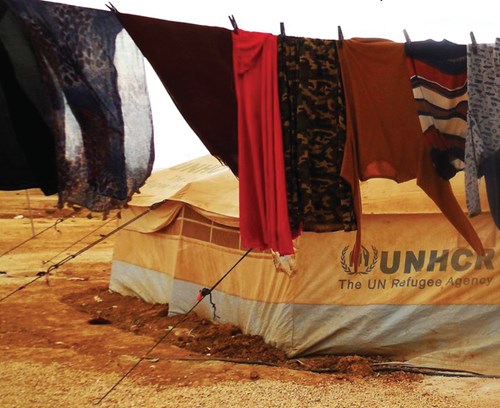
By C. L. Stambush
Many words describe Ellen Small Billard ’05: confident, articulate, pragmatic and visionary to name a few, but when asked to describe the terror Syrian refugees are suffering due to a civil war she’s at a loss for words. She’s not, however, at a loss for action.
Billard was living in Tianjin, China, with her husband in 2012, when she watched a documentary on the Syrian civil war. She sat in near catatonic horror as scenes of devastation flashed across the screen. The images of Homs, a city in Western Syria, were unlike any she’d ever witnessed: terrified children, injured elderly, black smoke rising from bombed buildings. For nearly 2,000 years it had been an agricultural trade center; now the nation’s third largest city lay in apocalyptic rubble.
“All war is brutal, certainly, but there is a level of brutality and terror in the Syrian conflict that makes it all the more horrific.” - Ellen Small Billard ’05
As a social worker Billard had seen “unimaginable things” in both the United States and as a consultant working with nonprofits in Southeast Asia involved in freeing children from the sex-trafficking industry. She’d “learned to function” and do her job without becoming overly emotional about the atrocities she witnessed. But the images on TV were beyond comprehension and seared her psyche. “The fact that [watching the documentary] literally broke me made me ask myself ‘Why is this so moving for you?’” she said.
Two years later, it’s a question Billard still can’t answer, but one she no longer ponders since shortly after posing it she decided to be a part of the solution at the grassroots level. “How could we not?” she said. “We saw the country being destroyed. How could we live with ourselves if we didn’t do anything?”
“Obviously a war or refugee problem is not a problem most of us could ever solve, but it doesn’t absolve you from the responsibility to do something.” - Ellen Small Billard
For Billard, getting involved meant travelling to Jordan where 600,000 refugees had fled. But she needed connections if her efforts were to be of value. She had no contacts in Syria or Jordan, despite her associations in the Middle East, and none were able to provide her with one. Unsure of what else to do, she Googled “Helping Syrian refugees in Jordan” and found Catherine, a British national living in Amman, who’d set up an ad-hoc organization in her garage to help collect supplies for Syrian refugees. Billard won’t give Catherine’s last name or any others in this story for fear of retaliation by the Syrian government, but she views them as God-sends. Staffed by volunteers, the small nonprofits assist families stripped of their homes and forced to flee into a small nation ill-equipped to deal with their overwhelming arrival.
Catherine insisted Billard bring cash rather than supplies when she came to Jordan, to help stimulate the local economy. She also wanted her to do the shopping personally so she could understand how transactions occurred. But before raising the money, Billard vetted Catherine via the Internet to ensure she was on the up-and-up and, in the end, followed her gut instinct and began raising money to help the refugees.
Billard posted her fundraising plans on Facebook, but most friends stateside paid little attention, she said, contending they likely thought it was just another one of her and her husband’s volunteer projects. People from their church in China, an expat congregation, donated the majority of the $5,000 raised. “People who had seen human suffering in their countries or had experienced it were compelled to give whatever they had.”
Catherine arranged for the Billards to stay with a young Syrian man named Maher, who cared for them by cooking dinner and serving tea. Introductions and relationships are crucial in the Middle East, as much of everything operates on them. He introduced them to refugee families living with Jordanian hosts and not in the United Nations refugee tents. People like Ali—a 15-year-old boy who was shot in the head while fleeing across the border with his family. Miraculously, he survived, but for days the only treatment he received was cotton balls plugging the wound. “We were not prepared for how moving the experience would be,” she said.
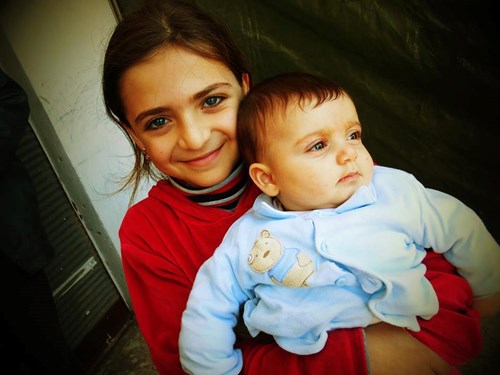
“If you think about all the world’s problems you’ll never do anything and you’ll just be depressed. Just think about one thing, one small step you can take to do something about it.” - Ellen Small Billard
By the time the couple left a week later, Billard knew her work had just begun. “I don’t know how to describe it, I just feel absolutely compelled to do more,” she said. “I feel it’s our responsibility to be advocates for what we’ve been privileged to see and the people we’ve been privileged to meet.”
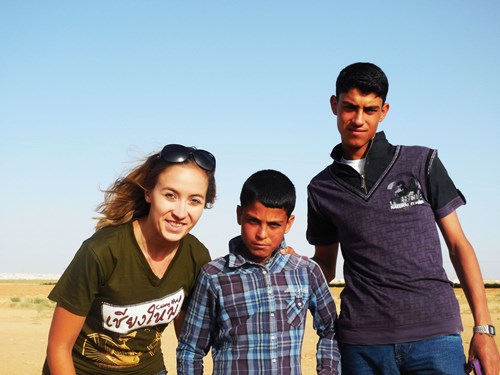
Executing relief efforts while living in China was frustrating for Billard, a self-described go-getter, but helpful because it required her to slow down and think about the best way to approach the problem. Analytical problem-solving is a skill initiated during her high school debate years, and it laid the foundation for who she would become. “It teaches you to solve really big problems, or how to take steps toward solving problems,” she said. “It teaches you the skill but also helps you realize that working toward such solutions is worthwhile. These are real problems real people face.”
The way Billard saw it, her role with the refugees would be as a fiduciary by partnering with grassroots organizations operating in Jordan and Syria, nonprofits equipped to administer humanitarian aid on a daily basis. She named the organization—now in the process of being established as 501(c)(3)—Road to Mafraq*, the name of the town that sits on the Jordanian/Syrian border. It’s the transit point out of a war-torn nation for Syrians who spilled over the border and into the UN’s tent city Za’atari, now the world’s second largest refugee camp. The tents, a sprawl of white canvas on a sea of sand where temperatures can reach over 100 degrees in the summer, houses 185 to 244 men, women and children in stifling conditions.
Road to Mafraq works with organizations offering immediate basic needs assistance, building long-term sustainable development and returning refugees to their homeland after the war. “My focus is working with grassroots organizations,” she said. “Yes, the UN is helping, and yes, USAID is helping, but there also are ad-hoc groups that have the potential and connections to reach places and families those aid agencies can’t.”
Billard is invested in helping Syrian refugees for at least the next five years, “because even once the war ends the communities will still feel the impact.” Through the people she’s met via Catherine and Maher, she’s begun building relationships of her own with those helping exiles. People like Pastor Nour. He’s constructing a community center to meet the needs of Syrian families living in host homes, in particular a school for their children because they have difficulty accessing education in Jordan due to their refugee status. “Pastor Nour isn’t only trying to meet the basic needs of refugees. He sees there are tens of thousands of refugees who now live in his tiny town,” she said. “They won’t all return to Syria even if the war ended tomorrow. They will be there for years, if not permanently.”
Since spring 2013, Billard has hosted two fundraisers. The first raised $5,000 and the second $12,000. Most of the funds went to organizations working within Jordan, but $500 was directed toward medical aid within Syria to those injured in the chemical weapons attack in August 2013.
Now back in United States, Billard is still learning what it takes to manage a nonprofit. And, reality is harsh. “We won’t be able to support each partner with financial assistance from each fundraiser. We’ll have to draw a line.” But even if Road to Mafraq is unable to give money to every group, Billard will continue to build relationships with unfunded groups, strengthening those ties for tomorrow.
The work she’s doing in the Middle East taught her to suspend her American expectations of how to get things done. Productivity is not measured by paperwork, but it’s paperwork that taught her to think analytically about the elements of a problem as a means for figuring out solutions. The skill may have started on the debate team at North High School, but it was sharpened during her years at USI majoring in English literature, before going on to earn a master’s degree in social work from University of Connecticut. “I approach most problems the way I would write a literary analysis essay—where you take the information available in a piece of literature and apply it to a real-life problem.”
To illustrate her point, Billard recalls writing an essay during her senior year at USI on Mary Shelley’s Frankenstein. “Frankenstein himself is not the monster, but rather he creates a monster he then loses control of. We do that a lot as human beings. We create something without really looking down the road at the consequences of our actions.”
Billard, however, is looking down the road and she’s comfortable expressing what she sees as her role in making a difference. But during her most recent trip to visit Syrian refugees she encountered one little girl who’s been scarred into silence by the war. The girl lived with her mother and sisters within a few hundred yards of their homeland in a UNHCR tent, yet couldn’t return home. Two of the sisters danced and laughed and for all outward appearances looked fine, like little giggly girls. But their sister hadn’t spoken since their home was bombed. “It’s very scary to see the psychological impact this war is having on Syrian children. Syria’s future,” she said. “We saw these families’ homes being destroyed on TV and now we are meeting them in person. It’s good to see them safe but it’s heartbreaking to know what lies on the other side for them. ”
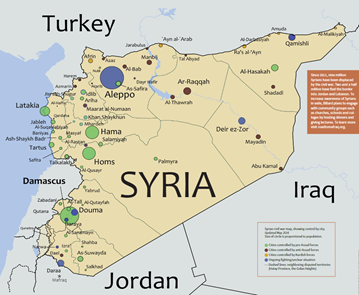
Since 2011, nine million Syrians have been displaced by the civil war. Two and a half million have fled the border into Jordan and Lebanon. To increase awareness of Syrians in exile, Billard plans to engage with community groups such as churches, schools and colleges by hosting dinners and giving lectures.
*The non-profit, Road to Mafraq, operated between 2013-2017
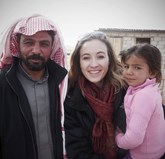
As an Evansville native, why did you decide to attend USI?
“I didn’t want to come to USI. I wanted to go out of state and went to [a Big Ten school], but then had unforeseen health issues and returned to Evansville at the end of my freshman year. I would never have made that choice on my own, but it turned out to be one of the best decisions of my life. Most of my teachers at [the Big Ten school] were grad students, and as much as they are smart, they have so much on their plates that they don’t have time for you. At USI I was taught by PhDs, and they made time for me.”
Can you describe the difference between the two universities?
“At [the Big Ten school] I felt like I was a college student and my life was a college campus. At USI, you get off campus. You have people from all walks of life… who bring a lot of different stuff to the table. The classes are small. USI worked for me. It was a community where people came together to talk about problems and to create community. I always felt I had a great sense of community here. USI is like a big state school with a small college feel. You really feel like you are part of the community.”
What did you do to get where you are today?
“I sought opportunities constantly. I didn’t care about formal office hours. I had relationships with my professors that when I knocked on their doors…none of them ever turned me away. I would pick my professors’ brains. I would write papers and want to know immediately what they thought of my analysis. They wanted me to change the world. They wanted me to use my skills and ability to do something positive, and to do it to the best of my ability.”
What was the overall message you came away with from USI?
“[My professors at USI] wanted me to know that what I learned was going to matter in the long run. The vision of my professors, to be able to see beyond the classroom, was very useful. USI does a great job in preparing students to go out and have great careers. It put an emphasis on your responsibility and your obligation toward your community.”